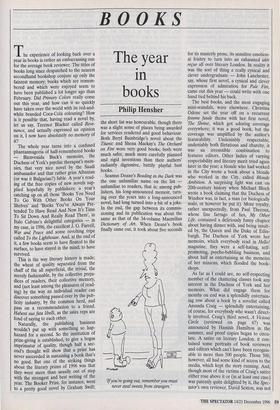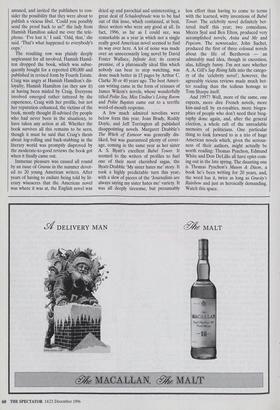BOOKS
The year in books
Philip Hensher
The experience of looking back over a year in books is rather an embarrassing one for the average book reviewer. The titles of books long since despatched to the nearest secondhand bookshop conjure up only the faintest memory; books which are remem- bered and which were enjoyed seem to have been published a lot longer ago than February. Did Primary Colors really come out this year, and how can it so quickly have taken over the world with its red-and- white branded Coca-Cola colouring? How is it possible that, having read a novel by, let us say, Terence Blacker called Reve- nance, and actually expressed an opinion on it, I now have absolutely no memory of it?
The whole year turns into a confused phantasmagoria of half-remembered books — Bienvenida Buck's memoirs, the Duchess of York's psychic therapist's mem- oirs, that very nice novel by the Saudi ambassador and that rather grim Albanian (or was it Bulgarian?) fable. A year's read- ing of the free copies of new novels sup- plied hopefully by publishers; a year's catching up on all those 'Books You Need To Go With Other Books On Your Shelves' and `Books You've Always Pre- tended To Have Read And Now It's Time To Sit Down And Really Read Them', in Italo Calvino's delightful categories — in my case, in 1996, the excellent J. G. Farrell, War and Peace and some revolting tripe called To the Lighthouse. And, at the end of it, a few books seem to have floated to the surface, to have stayed in the mind; to have survived. This is the way literary history is made; the wheat of quality separated from the chaff of the all superficial, the trivial, the merely fashionable, by the collective preju- dices of readers, their collective memory, and (not least among the pleasures of read- ing) by the way an individual reader can discover something passed over by the pub- licity industry, by the common herd, and pass on a recommendation to a friend. Ha bent sua fata libelli, as the sales reps are fond of saying to each other. ' Naturally, the publishing business wouldn't put up with something so hap- hazard for a second. So the institution of prize-giving is established, to give a bogus imprimatur of quality, though half a sec- ond's thought will show that a prize has never succeeded in sustaining a book that's no good. But one of the striking things about the literary prizes of 1996 was that they were more than usually out of step with the strongest and best writing of the year. The Booker Prize, for instance, went to a pretty good novel by Graham Swift; the short list was honourable, though there was a slight sense of places being awarded for services rendered and good behaviour. Both Beryl Bainbridge's novel about the Titanic and Shena Mackay's The Orchard on Fire were very good books; both were much safer, much more carefully planned and rigid inventions than their authors' radiantly digressive, battily playful best books.
Seamus Deane's Reading in the Dark was the one unfamiliar name on the list — unfamiliar to readers, that is; among pub- lishers, his long-announced memoir, turn- ing over the years into a long-announced novel, had long turned into a bit of a joke. In the end, the gap between its commis- sioning and its publication was about the same as that of the 34-volume Macmillan Dictionaty of Art. When Deane's book finally came out, it took about five seconds 'If you're going out, remember you must never steal sweets from strangers.' for its masterly prose, its sensitive emotion- al Irishry to turn into an exhausted idge recite all over literary London. In reality it was the sort of thing a really cynical and clever undergraduate — John Lanchester, say, whose first novel, a cynical and clever expression of admiration for Pale Fire, came out this year — could write with one hand tied behind his back.
The best books, and the most engaging mini-scandals, were elsewhere. Christina Odone set the year off on a recurrent femme fatale theme with her first novel, The Shrine, which got adoring coverage everywhere; it was a good book, but the coverage was amplified by the author's featurability. Undeniably respectable, undeniably both flirtatious and churchy, it was an irresistible combination to features editors. Other ladies of varying respectability and literary merit tried again later in the year; a blonde who had worked in the City wrote a book about a blonde who worked in the City, called Blonde Ambition. A surprising light was cast on 20th-century history when Michael Bloch wrote a book claiming that the Duchess of Windsor was, in fact, a man (or biologically male, or however he put it). More royalty, rather unexpectedly, from Paul Theroux, whose fine farrago of lies, My Other Life, contained a deliriously funny chapter about having dinner with, and being insult- ed by, the Queen and the Duke of Edin- burgh. The Duchess of York wrote her memoirs, which everybody read in Hello! magazine; they were a self-hating, self- promoting, psycho-babbling business, and about half as entertaining as the memoirs of her minions, which flooded the book- shops.
As far as I could see, no self-respecting member of the chattering classes took any interest in the Duchess of York and her memoirs. What did engage them for months on end was a splendidly entertain- ing row about a book by a novelist called Amanda Craig — splendidly entertaining, of course, for everybody who wasn't direct- ly involved. Craig's third novel, A Vicious Circle (reviewed on page 67) was announced by Hamish Hamilton in the summer, and proof copies began to circu- late. A satire on literary London, it con- tained some portraits of book reviewers and editors which can't have been recognis- able to more than 500 people. Those 500, however, all had some kind of access to the media, which kept the story running. And, though most of the victims of Craig's satire either rose above it or (in at least one case) was patently quite delighted by it, the Spec- tator's own reviewer, David Sexton, was not amused, and invited the publishers to con- sider the possibility that they were about to publish a vicious libel. 'Could you possibly send the proof back to us?' the lady from Hamish Hamilton asked me over the tele- phone. 'I've lost it,' I said. 'Odd, that,' she said. 'That's what happened to everybody's copy.'
The resulting row was plainly deeply unpleasant for all involved. Hamish Hamil- ton dropped the book, which was subse- quently bought for a reported £90,000 and published in revised form by Fourth Estate. Craig was angry at Hamish Hamilton's dis- loyalty; Hamish Hamilton (as they saw it) at having been misled by Craig. Everyone involved emerged rather tattered by the experience, Craig with her profile, but not her reputation enhanced, the victims of the book, mostly thought ill-advised (by people who had never been in the situation), to have taken any action at all. Whether the book survives all this remains to be seen, though it must be said that Craig's thesis about log-rolling and back-stabbing in the literary world was promptly disproved by the moderate-to-good reviews the book got when it finally came out.
Immense pleasure was caused all round by an issue of Granta in the summer devot- ed to 20 young American writers. After years of having to endure being told by lit- erary wiseacres that the American novel was where it was at, the English novel was dried up and parochial and uninteresting, a great deal of Schadenfreude was to be had out of this issue, which contained, at best, three writers who were any good at all. In fact, 1996, as far as I could see, was remarkable as a year in which not a single really good American novel seemed to find its way over here. A lot of noise was made over an unnecessarily long novel by David Foster Wallace, Infinite Jest; its central premise, of a platonically ideal film which nobody can bear to stop watching, was done much better in 15 pages by Arthur C. Clarke 30 or 40 years ago. The best Ameri- can writing came in the form of reissues of James Wilcox's novels, whose wonderfully titled Polite Sex, Miss Undine's Living Room and Polite Baptists came out to a terrific word-of-mouth response.
A few much admired novelists were below form this year. Joan Brady, Roddy Doyle, and Jeff Torrington all published disappointing novels. Margaret Drabble's The Witch of Exmoor was generally dis- liked, but was guaranteed plenty of cover- age, coming in the same year as her sister A. S. Byatt's excellent Babel Tower. It seemed to the writers of profiles to fuel one of their most cherished sagas, the Byatt-Drabble 'My sister hates me' story. It took a highly predictable turn this year,. with a slew of pieces of the 'Journalists are always saying my sister hates me' variety. It was all deeply tiresome, but presumably less effort than having to come to terms with the learned, witty inventions of Babel Tower. The celebrity novel definitely bet- tered itself this year; two comedians, Meera Syal and Ben Elton, produced very accomplished novels, Anita and Me and Popcorn. The newsreader, John Suchet, produced the first of three colossal novels about the life of Beethoven — an admirably mad idea, though in execution, alas, killingly funny. I'm not sure whether A. A. Gill's Sap Rising falls into the catego- ry of the 'celebrity novel'; however, the agreeably vicious reviews made much bet- ter reading than the tedious homage to Tom Sharpe itself.
And 1997? Well, more of the same, one expects, more dire French novels, more kiss-and-tell by ex-royalties, more biogra- phies of people who don't need their biog- raphy done again, and, after the general election, a whole raft of the unreadable memoirs of politicians. One particular thing to look forward to is a trio of huge American novels which, given the serious- ness of their authors, might actually be worth reading: Thomas Pynchon, Edmund White and Don DeLillo all have epics com- ing out in the late spring. The daunting one is Thomas Pynchon's Mason & Dixon, a book he's been writing for 20 years, and, the word has it, twice as long as Gravity's Rainbow and just as heroically demanding. Watch this space.



















































































































 Previous page
Previous page